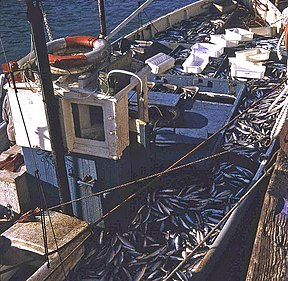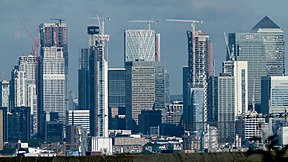Our website is made possible by displaying online advertisements to our visitors.
Please consider supporting us by disabling your ad blocker.
Fish for finance
| Part of a series of articles on |
| Brexit |
|---|
 |
|
Withdrawal of the United Kingdom from the European Union Glossary of terms |
Fish for finance[1][2][3] is a possible trade-off that has been considered by both sides in the trade negotiations between the United Kingdom and the European Union (EU) over their future relationship following Brexit in January 2020. The Brexit withdrawal agreement between the two parties called for an agreement on fisheries to be concluded by June 2020, followed by an agreement on financial services at the end of July, deadlines which were both missed. Both were expected to be part of the final EU–UK trade agreement reached by the end of 2020, the end of the Brexit transition period. The final agreement had some broad outlines for a future fishing deal, primarily gradual EU concessions of fishing quota in UK waters, but was largely silent on finance.
British commercial fishermen were among the most ardent supporters of Brexit before and after the 2016 referendum that began the process when a majority of voters opted for the country to leave the EU. Many of them had expressed discontent with the EU's Common Fisheries Policy (CFP), under which the UK has had to share its exclusive economic zone (EEZ) with other member states' fishing fleets; Brexit proponents have argued that British fishermen should be able to catch at least the majority of the fish in that portion of the country's EEZ around the island of Great Britain and off the coast of Northern Ireland. During the UK's membership in the EU, much of the fish that British fishermen have historically caught in the EEZ has been exported to mainland Europe, leading many British fish processors, fish farmers and inshore fishermen (whose catch of primarily shellfish is popular with consumers in France and Spain, but not the UK) to seek a continuation of the pre-2021 frictionless trade situation; conversely a majority of the fish consumed in the UK is caught outside British waters. EU fishermen who have themselves historically fished British waters plan to block imports of British fish, and even all British imports, if the UK limits their rights to do so. Industry advocates on both sides fear this could lead to potentially lethal violence on sea and land, in addition to the economic consequences of a trade war.[4][5][6] The EU's eight western coastal states, whose fleets partake of the catch in British waters, have asked that no overall trade deal with the UK be concluded without a fisheries agreement; the UK conversely believes the issue does not have to be settled first.
The British financial sector, which employs more people and accounts for a much greater share of the country's gross domestic product (GDP) than fishing, would like at the very least a declaration of stock market equivalence similar to what the EU has extended to the US, Hong Kong, Australia and (in the past) Switzerland. Ideally the City[a] wishes to maintain the level of access to EU markets it has enjoyed during the UK's membership in the bloc. EU officials and negotiators have said that they will be inclined to continue allowing that level of access only if the UK is likewise willing to allow the same level of access to its fisheries. Unlike the UK's fishermen, financial companies can move to take advantage of more favourable regulatory climates, and many have already begun relocating staff and operations to Dublin, Frankfurt, Paris or Amsterdam, or elsewhere in the EU.
Deadlines set originally by the Withdrawal Agreement were missed, in part due to the disruption caused by the COVID-19 pandemic. By the end of 2020, it did not appear to observers or the parties themselves as if a deal would be reached, and the UK and EU both began to prepare for the worst possible impacts of that transition. On 24 December, a deal was announced with a compromise on fishing quotas which UK fishing industry spokesmen found disappointing. Negotiations continue on a substantial financial services agreement, despite missing the original deadline of 31 March 2020.
- ^ Cite error: The named reference
Evening Standardwas invoked but never defined (see the help page). - ^ Cite error: The named reference
Reuters storywas invoked but never defined (see the help page). - ^ Cite error: The named reference
City A.M. piecewas invoked but never defined (see the help page). - ^ Keys, David (9 August 2019). "No-deal Brexit could trigger deadly clashes between fishermen, experts warn". The Independent. Retrieved 4 August 2020.
- ^ Sherwood, Harriet (23 February 2020). "What's the catch? British fishermen's hopes and fears for Brexit deal". The Guardian. Retrieved 11 March 2020.
- ^ McDonagh, Marese (14 October 2019). "Fishermen warn of 'mayhem' on seas in event of no-deal Brexit". The Irish Times. Retrieved 7 August 2020.
- ^ Roberts, Richard (2008). The City: A Guide to London's Global Financial Centre. Economist. ISBN 9781861978585. Retrieved 12 October 2020.
Cite error: There are <ref group=lower-alpha> tags or {{efn}} templates on this page, but the references will not show without a {{reflist|group=lower-alpha}} template or {{notelist}} template (see the help page).
Previous Page Next Page




